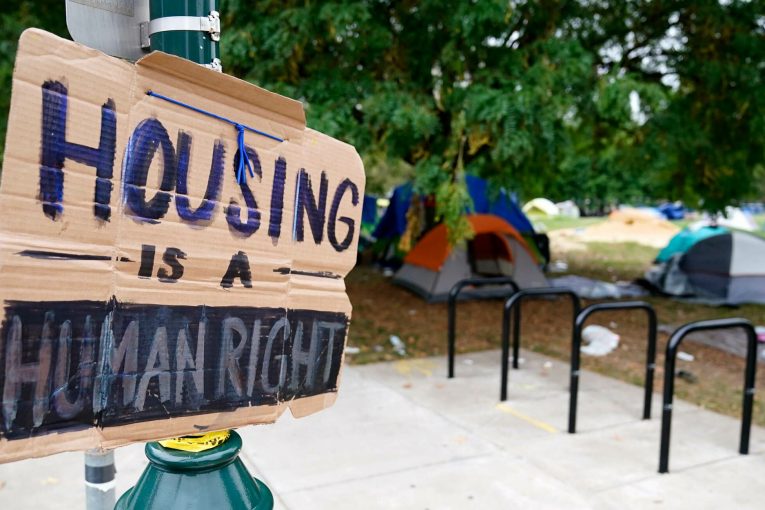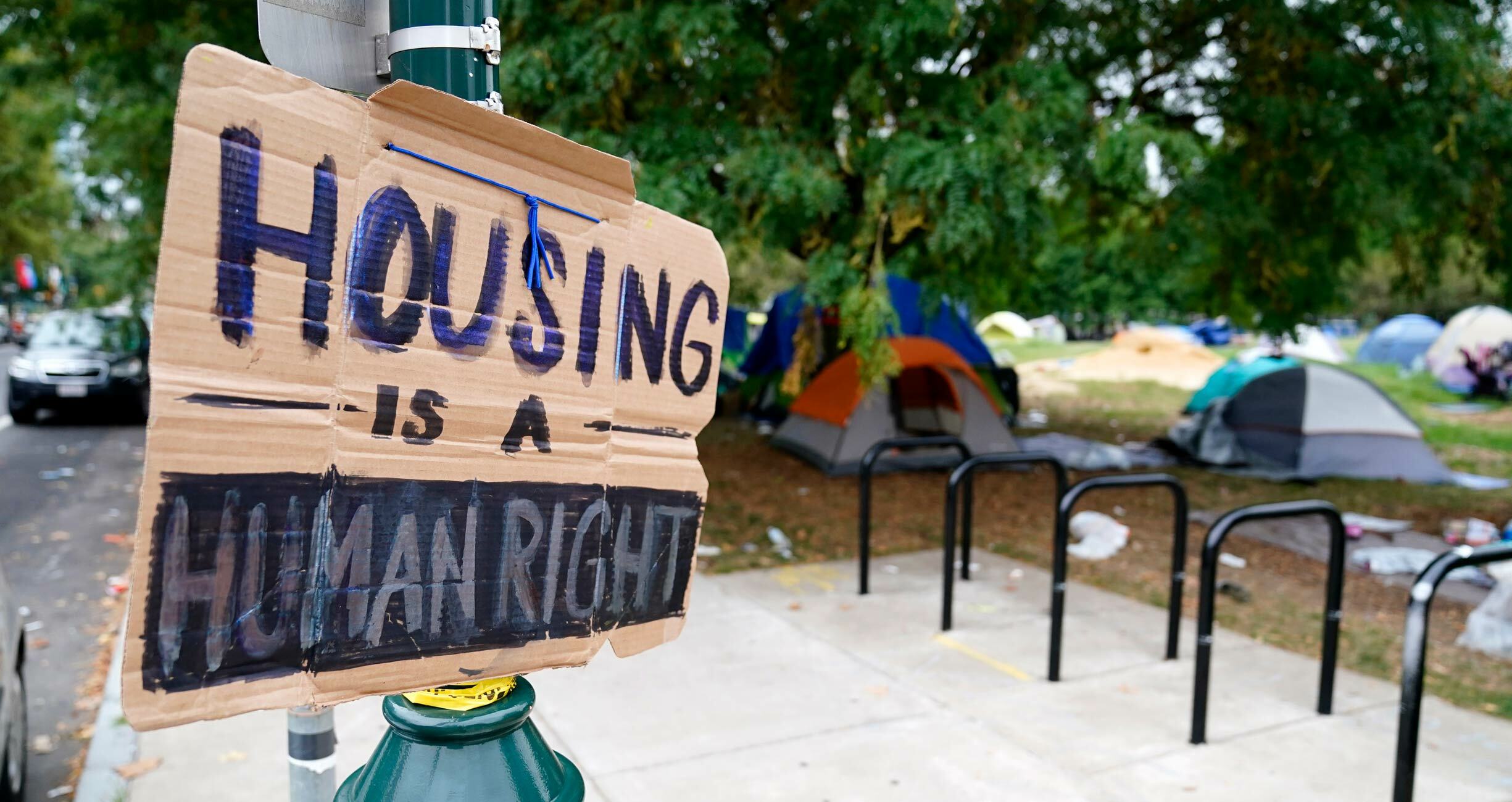

By Nazish Dholakia
It took two years of constant effort for Ashia Wilson to find a home for herself and her son to share in Lansing, Michigan. She received one denial letter after another from landlords, spending hundreds of dollars on fees for applications that went nowhere. She resorted to spending nights on family and friends’ couches and, occasionally, at hotels for $100 per night. She and her son even slept in her car once.
“It was expensive, and I couldn’t afford it for long,” Wilson told Vera.
Eventually, they ended up at a shelter. All the while, Wilson was working two jobs and going to school.
Wilson’s conviction history—she was sentenced to 90 days in jail followed by two years on probation—made it extremely challenging for her to find a stable place for her and her son to live.
Approximately 450,000 people are released from state or federal prisons every year, and millions more are released from jails annually. They all need to be able to secure safe, affordable housing when they return to their communities. And yet, public housing authorities (PHAs) and private landlords alike impose needless barriers that can make it hugely difficult for people with any history of arrest or incarceration to find a place to  live.
live.
Research does not find any relationship between having a conviction record—even a felony record—and housing success. Landlord associations recommend looking at rental history, references, and ability to pay. The United States Department of Housing and Urban Development (HUD) has also stated that a conviction history “is not a good predictor of housing success.” Research shows that most people with a conviction in their past do not have another conviction.
Policies that exclude people with arrest or conviction histories from accessing housing are counterproductive and do not make our communities safer. Studies have found that people who have housing are more likely to find and keep employment, develop supportive relationships, and avoid additional convictions—all of which contribute to safer communities. But people with histories of incarceration are close to 10 times more likely to experience homelessness than those without, and people experiencing homelessness are 11 times more likely to be arrested than people who have housing. Policies that bar people with arrest or conviction histories from accessing housing are harmful and do nothing but contribute to cycles of housing insecurity, homelessness, and incarceration.
Federal guidance
On Wednesday, HUD proposed regulations that would help ensure that people are not automatically denied access to HUD-assisted housing solely because of their arrest or conviction record. The proposed regulations state that HUD-assisted housing providers and PHAs must only consider arrest or conviction histories that are relevant to the health and safety of other residents and staff. They must also carry out a “fact-specific and individualized assessment” before denying anyone tenancy or admission based on their arrest or conviction history.
Finally, HUD requires that HUD-assisted housing providers and PHAs implement a lookback period, which limits the consideration of old convictions. HUD encourages them to only consider convictions that occurred within the last three years and writes that a lookback period of any more than this is “presumptively unreasonable.” During the two-month comment period, the public has a chance to voice their support for the proposed regulations.
“For too long, PHAs and other housing providers have used their wide discretion to bar people with records from housing,” said John Bae, director of Vera’s Opening Doors initiative. “HUD’s proposed changes demonstrate how far we have come in our understanding of the criminal legal system and the lasting effects of incarceration. Implementing these regulations will bring us a step closer to ensuring that the right to housing is afforded to all.”
Statewide legislation
Currently, lawmakers in two Midwest states are looking to remove the barriers people leaving incarceration face when seeking a place to live. The Michigan Fair Chance Access to Housing Act, currently in the Michigan House—and a similar bill recently introduced in Minnesota—aim to prohibit landlords from discriminating against people with arrest or conviction histories. Both bills would defer the background screening to a later stage in the application process and limit how landlords can use background checks when evaluating rental applications. For example, the version of the Michigan bill currently under debate would bar landlords from considering convictions that occurred more than three years ago. Both bills would also limit the types of convictions that can be considered, and applicants who are denied because of their conviction history can require landlords to provide an individualized review.
“People with histories of arrest or conviction should not face a lifetime of discrimination when it comes to something as basic as having a place to live,” said Bae. “The legislation we’re supporting in Michigan and Minnesota would offer thousands of formerly incarcerated people—who are working to rebuild their lives and support their families—a fair chance.”
“The Fair Chance Access to Housing Act is an essential measure that fosters public safety, curbs recidivism, and empowers individuals with criminal histories to obtain stable housing,” wrote Genesee County Sheriff Christopher Swanson in the Bridge Michigan. “As a sheriff, it is incumbent upon me to support initiatives that establish fairer and more secure and safe communities. The implementation of the Fair Chance Housing Act is a significant stride in this direction.”
Several cities, including Detroit, New York City, and Washington, DC—as well as states like Colorado and New Jersey—have also moved to pass fair chance housing laws, which (with some exceptions) prohibit landlords from barring people from housing based on their conviction history.
Fighting for a fair chance
Wilson spent eight months and seven days at the shelter in Lansing before she found a landlord who would approve her application. Finally, she had an apartment of her own.
“[The landlord] was just like, ‘I’m gonna give you a chance,’ and that was it,” said Wilson.
Now, Wilson is working to ensure that other people experiencing homelessness also have that chance. In her role as manager of authentic engagement at the Michigan Coalition Against Homelessness, she is focused on elevating the voices of people with lived experience and ensuring they play an active role in shaping policy.
One in three adults in the United States has a history of criminal legal system involvement. Preventing them from securing housing doesn’t benefit our communities. Rather, granting access to housing for all people is vital to our communities’ well-being.
Originally published by Vera Institute of Justice
Nazish Dholakia is a Senior Writer with Vera Institute of Justice





